Exception Handling
Introduction
CONCEPT: An exception is an unexpected condition or error in the program. Most can be handled with proper coding (logically). Occasionally methods cannot continue:
- A file does not exist [cannot find the file]
- A physical device is not available [database does not exist]
- Input data is not valid [validate your input (using a loop)]
- Arithmetic error such as dividing by zero [validate input]
- Converting text to a number
Conventional Error Handling
Pass an error code as a return value:
- The return code must be checked to see if the value coming back is acceptable or not [works but more work – old style]
- Extra logic is required
Exit the program:
- The user may not want to have the program quit on him/her [have a continue loop to let the user try again]
Crash - BAD:
- There is nothing worse than a program crashing; it is worse than the program coming to an end
Blue Screen of Death
This infamous Windows error is a result of an exception that was not expected or handled correctly. Exceptions, when they happen, are handled in the following order:
- The program code: programmers do their best to anticipate all possible error conditions.
- The virtual machine: if the program does handle all possible errors, then the environment the code is running in must check it.
- The OS: when the error is severe enough to get past the VM then the OS must handle the error or crash the OS (Blue Screen of Death)
Uncaught Exception
Consider the code below:
class UncaughtException
{
public static void Main(string[] args)
{
// declare variables
int numerator = 10;
int denominator = 0;
Console.WriteLine(numerator / denominator); // causes an exception
Console.WriteLine("This text will not display");
}
}
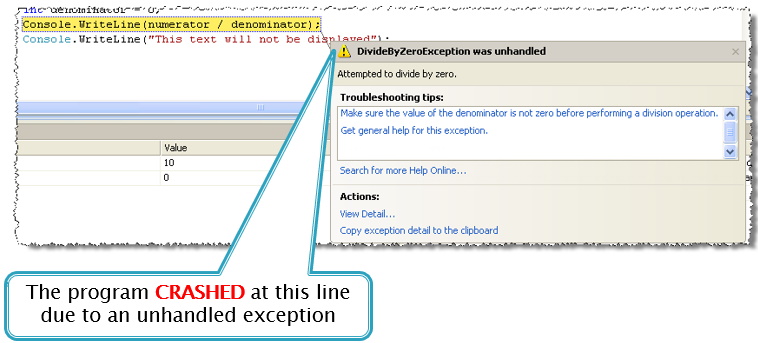
Handle Error Logically
class HandleErrorWithLogic
{
public static void Main(string[] args)
{
// declare variables
int numerator = 10;
int denominator = 0;
// use a decision to check if the division can proceed
if (denominator != 0)
{
Console.WriteLine(numerator / denominator); // causes an exception
}
else
{
Console.WriteLine("Divide By Zdero Error!");
}
}
}
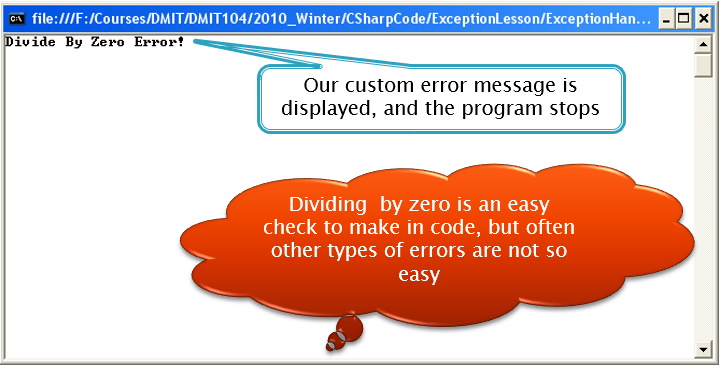
Try-Catch
The Try-Catch is similar in coding structure to an If-Then-Else. Logically it looks like:

Consider the following code:
class TryCatchHandling
{
public static void Main(string[] args)
{
// declare variables
int numerator = 10;
int denominator = 0;
try
{
Console.WriteLine(numerator / denominator);
}
catch (Exception ex) // General exception type
{
Console.WriteLine("ERROR: " + ex.Message);
}
}
}
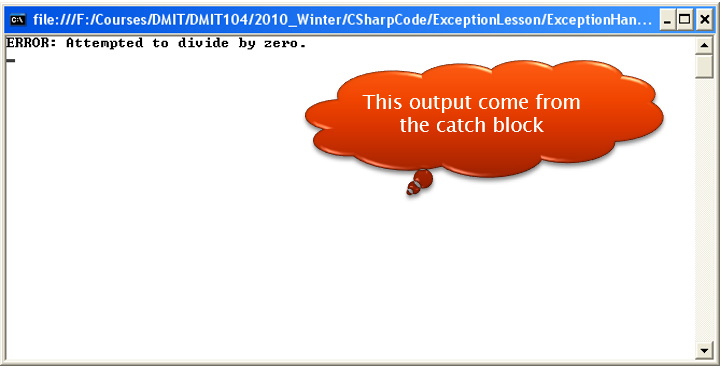
Try-Catch-Finally
_Note: This is an optional concept.
You may want to include a condition that must happen, even if an exception is caught (such as closing a file or database connection); this is called a finally block.
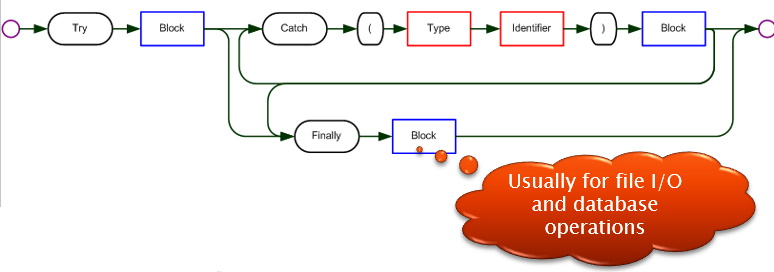
Consider the following code:
class TryCatchFinally
{
public static void Main(string[] args)
{
// declare variables
int numerator = 10;
int denominator = 0;
try
{
Console.WriteLine(numerator / denominator);
}
catch (Exception ex) // General exception type
{
Console.WriteLine("ERROR: " + ex.Message);
}
finally
{
Console.WriteLine("This is the finally block ...");
}
}
}
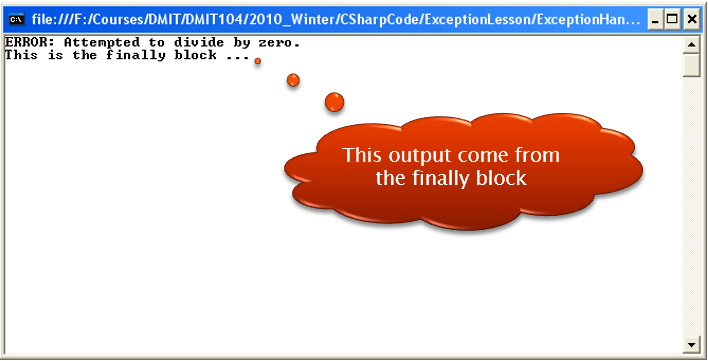
Specific Exceptions
One can always use the Exception class but often it is useful to use specific exceptions (the specific exceptions inherit from Exception). When using specific exceptions their catch blocks are placed first in order of the detail the exceptions are thrown.
Consider the following code:
class SpecificExceptions
{
public static void Main(string[] args)
{
// declare variables
int numerator = 10;
int denominator = 0;
try
{
Console.WriteLine(numerator / denominator);
}
catch(DivideByZeroException ex)
{
Console.WriteLine("DIVISION ERROR: " + ex.message);
}
catch(ArithmeticException ex)
{
Console.WriteLine("MATH ERROR: " + ex.Message);
}
catch (Exception ex)
{
Console.WriteLine("GENERAL ERROR: " + ex.Message);
}
}
}
Note: The order the exceptions are caught from the most to the least specific (general).